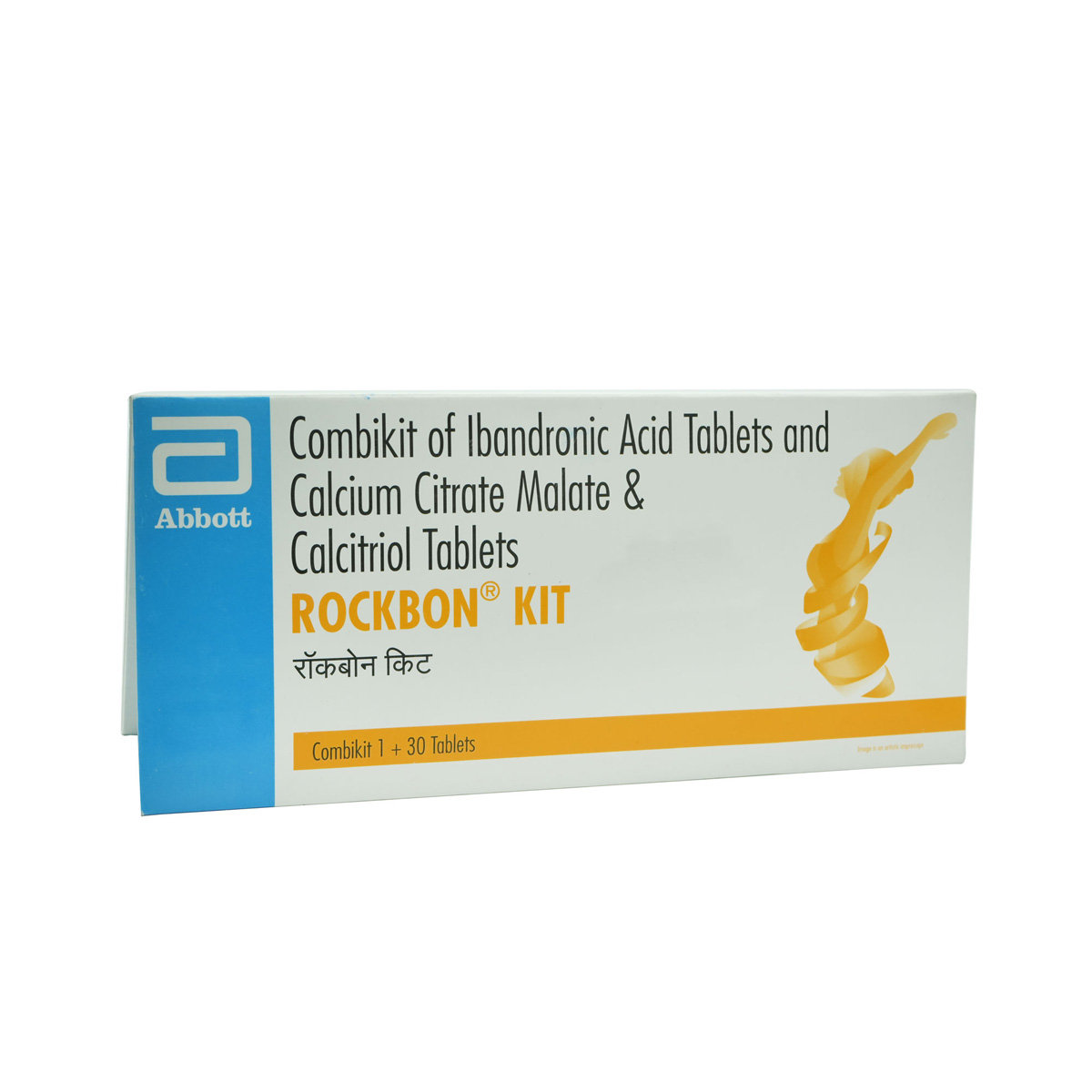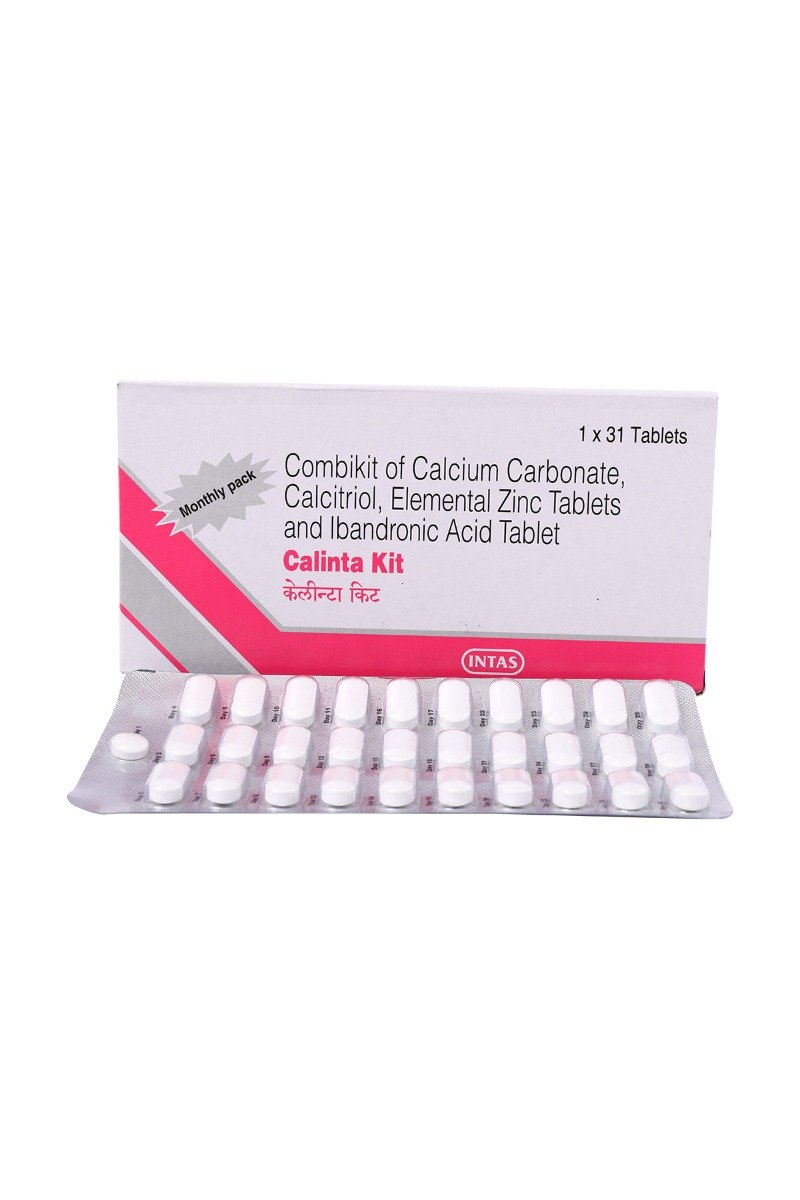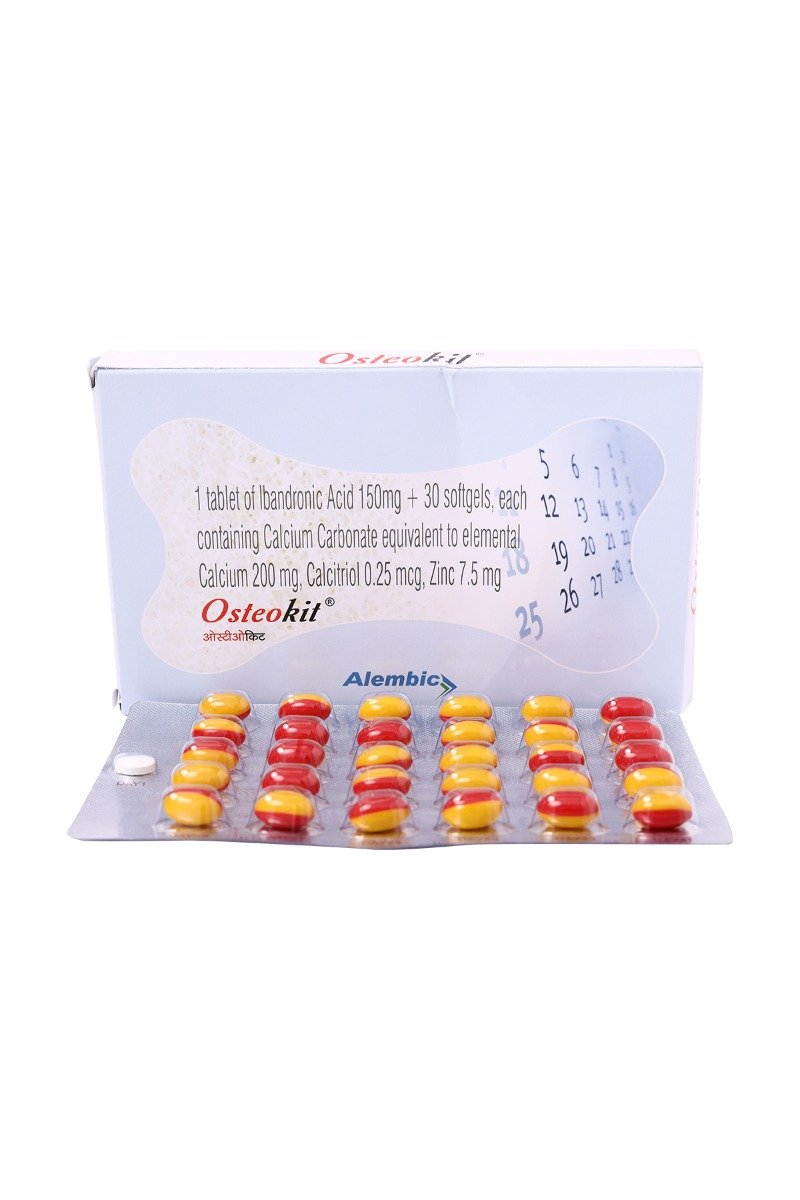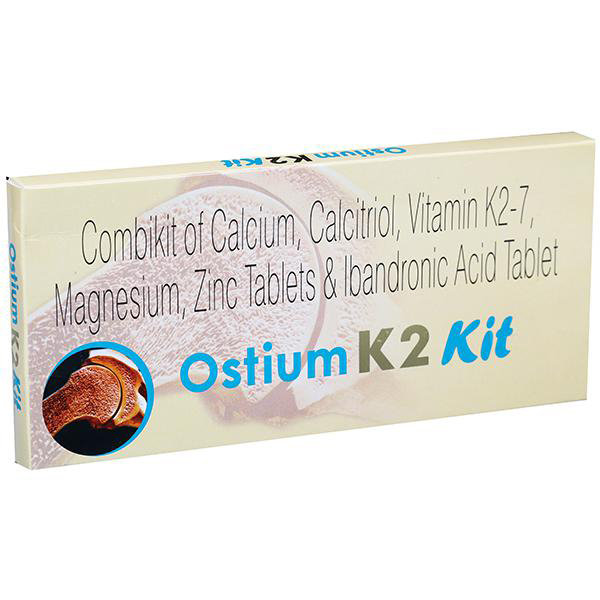Ibandronic Acid+elemental Calcium+calcitriol
About Ibandronic Acid+elemental Calcium+calcitriol
Calcitriol+elemental Calcium+ibandronic Acid is a combination medicine primarily used to treat osteoporosis (weak and brittle bones). Osteoporosis is a bone disease that makes the bones weak and brittle by decreasing bone density. Symptoms include backache, easily breaking bones, and hunched or stooped posture.
Calcitriol+elemental Calcium+ibandronic Acid contains Elemental Calcium (mineral), Calcitriol (Vitamin D3), and Ibandronic acid (biphosphonate). Elemental Calcium provides essential nutrients necessary for bone formation and maintenance. Calcitriol is a synthetic version of Vitamin D3 that raises Vitamin D levels and increases calcium levels in the blood. Ibandronic acid is a bisphosphonate that reverses bone loss and increases bone mass.
Your doctor will decide the duration based on your medical condition. In some cases, Calcitriol+elemental Calcium+ibandronic Acid can cause side effects like bone/muscle pain, muscle cramps, stiffness in joints, headache, back pain, indigestion, heartburn, and diarrhoea. Most of these side effects of Calcitriol+elemental Calcium+ibandronic Acid do not require medical attention and gradually resolve over time. However, if these side effects persist longer, please consult your doctor.
Please tell your doctor if you have hypercalcemia (high calcium levels), hypervitaminosis D (high vitamin D levels), and malabsorption syndrome (difficulty absorbing nutrition from food). Brief your medical history to the doctor in advance if you have heart/kidney/liver diseases, kidney stones, and ulcers. Consult your doctor if you are pregnant or breastfeeding. Calcitriol+elemental Calcium+ibandronic Acid is not recommended for children and adolescents below 18 years.
Uses of Ibandronic Acid+elemental Calcium+calcitriol
Medicinal Benefits
Calcitriol+elemental Calcium+ibandronic Acid is used to treat osteoporosis (weak and brittle bones). Calcitriol+elemental Calcium+ibandronic Acid consists of Elemental Calcium, Calcitriol (Vitamin D3), and Ibandronic acid. Elemental Calcium provides essential nutrients necessary for bone formation and maintenance. Calcitriol is a synthetic version of Vitamin D3 which helps in improving the absorption rate of calcium from the intestine. Ibandronic acid belongs to the class of bisphosphonates. It reverses bone loss and increases bone mass. It works by inhibiting the action of osteoclasts (a bone cell that breaks down bone tissue), thus helping in the reduction of fractures.
Directions for Use
Storage
Side Effects of Ibandronic Acid+elemental Calcium+calcitriol
- Bone/muscle pain
- Muscle cramps
- Stiffness in joints
- Headache
- Back pain
- Indigestion
- Heartburn
- Diarrhoea
Drug Warnings
Let your doctor know if you are allergic to any of the components in Calcitriol+elemental Calcium+ibandronic Acid. Calcitriol+elemental Calcium+ibandronic Acid is not recommended if you have hypercalcemia (high calcium levels), hypervitaminosis D (high vitamin D levels), and malabsorption syndrome (difficulty absorbing nutrition from food). Brief your medical history to the doctor if you have any heart/kidney/liver diseases, kidney stones, ulcers, swallowing or digestive problems, or inflammation of the gut. Consult your doctor if you are pregnant and breastfeeding. It is advised to limit alcohol consumption since it can affect calcium absorption. Calcitriol+elemental Calcium+ibandronic Acid is not recommended for children and adolescents below 18 years.
Drug Interactions
Drug-Drug Interaction: Calcitriol+elemental Calcium+ibandronic Acid may interact with drugs treating high cholesterol levels (cholestyramine), heart-related drugs (digoxin), water pills (hydrochlorothiazide), fits medicines (phenobarbital, phenytoin), steroids (prednisone, dexamethasone), pain killers (aspirin, naproxen), hormones (levothyroxine), and supplements containing magnesium, iron or aluminium.
Drug-Food Interaction: Avoid or reduce the intake of caffeine, soft drinks, and alcohol, as they may inhibit calcium absorption.
Drug-Disease Interaction: Inform your doctor if you have hypercalcemia, hypervitaminosis D, malabsorption syndrome, Vitamin D toxicity, heart/kidney/liver diseases, kidney stones, ulcers, swallowing or digestive problems, and inflammation of the gut.
Drug-Drug Interactions Checker List:
Safety Advice

Alcohol
cautionDrinking alcohol can affect calcium absorption; hence it is advised to limit the alcohol intake while using Calcitriol+elemental Calcium+ibandronic Acid.

Pregnancy
cautionIbandronic acid in Calcitriol+elemental Calcium+ibandronic Acid is not recommended during pregnancy. Please consult your doctor for more information.

Breast Feeding
cautionConsult your doctor before taking Calcitriol+elemental Calcium+ibandronic Acid if you are breastfeeding. Ibandronic acid in Calcitriol+elemental Calcium+ibandronic Acid is not recommended during breastfeeding.

Driving
safe if prescribedCalcitriol+elemental Calcium+ibandronic Acid has negligible effects on driving ability.

Liver
cautionLet your doctor know if you have any history of liver diseases before taking Calcitriol+elemental Calcium+ibandronic Acid. Hepatic impairment/liver disease can alter the metabolic and therapeutic activity of certain Vitamin D forms.

Kidney
cautionIt is advised to seek doctor advice before starting Calcitriol+elemental Calcium+ibandronic Acid if you have kidney stones or undergoing dialysis.

Children
unsafeCalcitriol+elemental Calcium+ibandronic Acid is not recommended for children and adolescents below 18 years.
Habit Forming
Diet & Lifestyle Advise
- Include dairy products like milk, yoghurt, cheese, or milk-based custard in your diet.
- Eat daily a serving of broccoli, cabbage, bok choy, spinach, and other green leafy vegetables.
- Include zinc-rich sources like meat, shellfish, legumes, hemp seeds, nuts, eggs, dairy products, whole grains, potatoes, kale, and dark chocolate in your diet.
- Snack on calcium-rich nuts like Brazil nuts or almonds.
- Sprinkle sesame seeds over your food, vegetables, and salads. Sesame seeds are high in calcium.
- Avoid or reduce the intake of caffeine, soft drinks, and alcohol, as they may inhibit calcium absorption.
- Replace the meat with tofu or tempeh for extra calcium in your food.
Patients Concern
Disease/Condition Glossary
Osteoporosis: It is a bone disease that makes the bones weak and brittle by decreasing bone density. It is a silent disease since it is not revealed until a bone is broken easily or fractured. Osteoporosis can be triggered by many factors like age, sex, low calcium diet, hormonal changes, and medical conditions like gastrointestinal diseases, rheumatoid arthritis, certain types of cancer, and HIV/AIDS. Symptoms include backache, easily breaking bones, and hunched or stooped posture. Thinning of bones can be prevented by treatment with medications, calcium supplements, a calcium-rich diet, and lifestyle changes.
FAQs
Calcitriol+elemental Calcium+ibandronic Acid treats low levels of calcium in the blood and osteoporosis. It consists of Elemental Calcium, Calcitriol, and Ibandronic acid. These constituents help in providing calcium to the body and help in bone formation and maintenance. Calcitriol+elemental Calcium+ibandronic Acid further helps in restoring bone mass and reduces the chances of easy fractures.
If you miss a dose, take it as soon as you remember. However, if it is time for the next scheduled dose, skip the missed dose and follow your usual dosage.
Calcium supplements may cause kidney stones due to excess calcium deposition when used for a prolonged period. Please consult your doctor before taking Calcitriol+elemental Calcium+ibandronic Acid if you have any kidney problems or a history of kidney stones.
Calcitriol+elemental Calcium+ibandronic Acid is used to increase low levels of calcium in the body. Hence it is not advised to use Calcitriol+elemental Calcium+ibandronic Acid if you have hypercalcemia since it causes an overdose of calcium leading to kidney stones and other effects.
Calcitriol in Calcitriol+elemental Calcium+ibandronic Acid can increase inorganic phosphate levels in serum; hence it should be cautiously used in patients undergoing dialysis to maintain adequate phosphorus levels and avoid ectopic calcification (calcium deposition). It is advised to follow a low phosphate diet to control serum phosphorus levels in patients undergoing dialysis.










